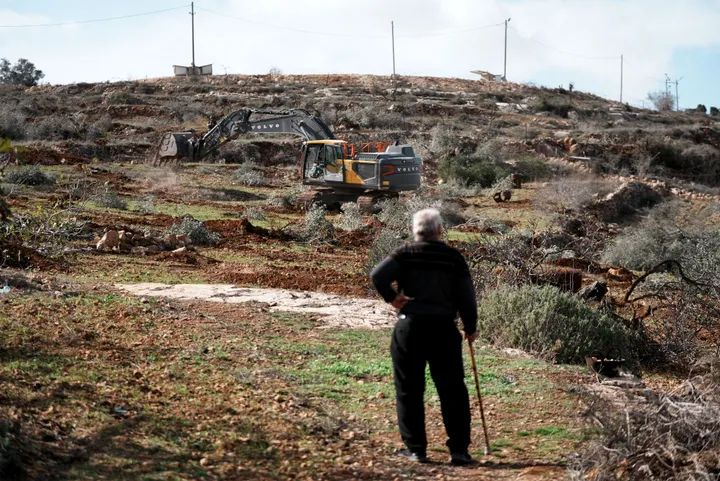By Mazhun Idris
What's common to the Greek philosopher Aristotle, the Russian novelist Leo Tolstoy, the American poet Sylvia Plath, and the Hollywood actor Morgan Freeman? Here's the buzz: their shared love of beekeeping!
Nature's most prodigious and prolific pollinator doesn't just pick nectar to make breakfast better, or prompt Winnie-the-Pooh to go, "How about a small mackerel of honey?"
For Fauzziyah Ebunoluwa Isiak, a budding apiarist in the southwestern Nigerian city of Lagos, beekeeping reflects the cycle of life. And hers, too.
The one that made her switch careers from being a policewoman to building a beekeeping business infused the spirit of entrepreneurship. It made her turn a personal tragedy into a source of motivation.
"Bees are remarkable creatures," she tells TRT Afrika. "I head out at dawn every day to engage with my bees. My days aren't solely dedicated to honey harvesting. Instead, I spend significant time observing and studying the bees.”
Like many beekeepers, Fauzziyah finds spending time with bees and caring for the hives therapeutic. "I plant flowers, tend to the surroundings and closely monitor the bees' behaviour, mating patterns, and nectar-collection techniques.
"This deep understanding helps me provide the right plants and flowers to enhance their growth and well-being," she says.
Not long ago, Fauzziyah would have been surprised herself had someone predicted that she would quit her job as a policewoman to blaze a trail as a farmer and beekeeper in a country struggling to improve its agriculture.
She hadn't even harvested the first ounces of honey from her hives when her father fell ill and died. His death was partly blamed on consuming adulterated honey from the local market.
Her father's death made Fauzziyah realise that countless other honey consumers could suffer from marketed honey products spiked with harmful chemicals. "This tragedy propelled me to take beekeeping seriously — also as a way of giving back to my community."
To ensure that her customers get the purest honey, Fauzziyah uses only trusted delivery agents and sometimes pays extra money to logistics companies. "I personally harvest the honey and package it for onward delivery, just to be sure," she says.
Ecology and economy
According to the Food and Agricultural Organisation (FAO), bees provide a critical link in maintaining our ecosystems, especially in plant pollination.
"Bees play a major role in maintaining biodiversity, ensuring the survival of many plants, enhancing forest regeneration, providing sustainability and adaptation to climate change and improving the quality and quantity of agricultural production systems," it states.
Aside from economic value, beekeeping and honey farming are crucial to agriculture and culinary traditions worldwide. Thus, effectively utilising beekeeping resources is a major factor in sustainable forestry, fauna and conservation management.
In 2019, the Nigerian Export Promotion Council stated that Nigeria could earn up to $10 billion annually through domestic and international trade in honey and other beehive products.
According to a study by Dr. C. Ogbari on apiculture in Nigeria's economic history, "bee farming began in the land that is today's Nigeria between 1000 and 1500 when Arab travellers in West Africa brought it to the present-day northern region".
Traditional apiculture in the different regions of Nigeria used to be done in calabashes placed on trees. Beekeepers would also use plaited grasses. The honeycombs would be harvested after dark, after a full moon or before the appearance of a new moon.
Be it forests, farmlands or even cities; bees now abound in natural nesting enclosures such as tree grooves and cavities, ant hills, rocks, under bridges, ceilings and other man-made structures.
Nigeria's International Institute of Tropical Apiculture in Ibadan is one of the local institutions supporting modern beekeeping. The institute provides modern hives made of wood or steel drums. These are fitted with wooden top bars.
Beekeeping spans the entire gamut of activities related to the practical management of social bee species, providing shelter for the colonies to protect them from adverse weather conditions and harvesting the honey they produce for commercial distribution.
Hive of potential
In Nigeria, beekeeping is still counted among small-scale businesses and can be started with about $200. If run properly, it can become a lucrative business due to its low maintenance and labour costs.
Even though Fauzziyah admits that passion is at the core of her beekeeping journey, this is constantly accentuated by inspiration from both happy and difficult experiences.
"I have always been drawn to agriculture. Besides beekeeping, I have explored various farming ventures, including crop and poultry farming," she says.
Being a small-holding entrepreneur, Fauzziyah started out by trying to find a form of agriculture that was profitable and with minimal recurrent expenses. She tried poultry but was discouraged by the cost of feeding the birds to sustain production.
"I then thought about beekeeping because bees don't need to be fed regularly. The prospect of being able to make medicinal honey swung the deal," she tells TRT Afrika.
Sustenance challenge
According to the UN’s Food and Agricultural Organisation, "close to 75% of the world's crops that produce fruits and seeds for human consumption depend, at least in part, on pollinators for sustained production, yield and quality".
As natural pollinators, bees are vital to the planet and human existence. Bees and other pollinators ensure food security, nutrition, biodiversity and natural ecosystem maintenance.
Fauzziyah believes that apiarists in Nigeria need to be trained in modern beekeeping, including safety, hygiene, species, and artificial insemination, to produce the bee queens central to every beehive.






















